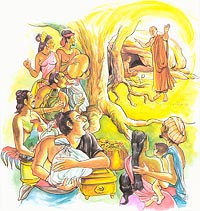05 01 2012
LESSON 485 Dhammapada Verses 26 and 27 Balanakkhattasanghuttha
Vatthu Meditation Leads To
Bliss This was said by the Blessed One, said by the Arahant, so I
have heard: “There are these three fermentations. Which three? The
fermentation of sensuality, the fermentation of becoming, the fermentation of
ignorance. These are the three fermentations.”
FREE ONLINE eNālandā Research &
Practice UNIVERSITY & BUDDHIST
GOOD NEWS
LETTER through
Through http://sarvajan.ambedkar.org
THE BUDDHIST ON LINE GOOD NEWS LETTER
COURSE PROGRAM
LESSON 484
Practice a Sutta a Day Keeps Dukkha Away
POLITICS
IS SACRED WITH HIGHLY PERFORMING BEST AND MERITORIOUS GOVERNANCE OF UP
CM FULLY AWAKENED WITH AWARENESS MAHA MAYAWATIJI WHO IS THE ONLY CM
SUCCESSFULLY COMPLETED HER FULL TERM WHO WILL WIN WITH A THUMPING
MAJORITY OF 303 IN THE NEXT ELECTION AND ULTIMATELY BECOME THE PM OF
PRABUDDHA BHARATH.Since Mayawati’s trusted core group includes upper caste aides and
advisers. Small-time traders, the classical petit-bourgeoisie, Mayawati is determination to count herself in as a mass messiah. The BSP is the only party that speaks of Sarvajan Hithay Sarvajan Sukhay i.e., welfare and happiness of the entire people.Please visit http://sarvajan.ambedkar.org for details.

Verse 27. Meditation Leads To Bliss
Don’t indulge in heedlessness!
Don’t come near to sexual joys!
The heedful and contemplative
attains abundant bliss.
Explanation: Do not indulge in heedlessness.
Avoid craving for sensual pleasures, whatever their nature. The mindful person
is tranquil in mind. He will attain the great bliss.

Verse 26. Treasured Mindfulness
Foolish folk of little wit
in heedlessness indulge,
the one who’s wise guards heedfulness
kin to the greatest wealth.
Explanation: Those who are foolish and
indiscriminating indulge in heedlessness. But the wise cherish mindfulness as a
great treasure. The foolish people live a life of sensual pleasure. They
indulge in pursuits that are not at all conductive to spiritual advancement. To
obtain worldly acquisitions, people need wealth. In the same way, to obtain
high spiritual acquisitions we need some wealth, and that wealth is
mindfulness.
Dhammapada Verses 26 and 27
Balanakkhattasanghuttha Vatthu
Pamadamanuyuñjanti
bala dummedhino jana1
appamadañca medhavi
dhanam setthamva rakkhati.
Ma pamadamanuyuñjetha
ma kamaratisanthavam
appamatto hi jhayanto
pappoti vipulam sukham.
Verse 26: The foolish and the ignorant give
themselves over to negligence; whereas the wise treasure mindfulness as a
precious jewel.
Verse 27: Therefore, one should not be
negligent, nor be addicted to sensual pleasures; for he who is established in
mindfulness, through cultivation of Tranquillity and Insight Development
Practice, experiences supreme happiness (i.e., realizes Nibbana).
1. bala dummedhino jana: the foolish
and the ignorant. The foolish mentioned in the story were the hooligans who
were given up to wild revelry and disorder during the Balanakkhatta festival.
They were not mindful of others or of the consequence for themselves in this
world and the next.
The Story of Balanakkhatta Festival
White residing at the Jetavana monastery, the
Buddha uttered Verses (26) and (27) of this book, in connection with the
Balanakkhatta festival.
At one time, the Balanakkhatta festival was
being celebrated in Savatthi. During the festival, many foolish young men
smearing themselves with ashes and cow-dung roamed about the city shouting and
making themselves a nuisance to the public. They would also stop at the doors
of others and leave only when given some money.
At that time there were a great many lay
disciples of the Buddha, living in Savatthi. On account of these foolish young
hooligans, they sent word to the Buddha, requesting him to keep to the
monastery and not to enter the city for seven days. They sent alms-food to the
monastery and they themselves kept to their own houses. On the eighth day, when
the festival was over, the Buddha and his disciples were invited into the city
for alms-food and other offerings. On being told about the vulgar and shameful
behaviour of the foolish young men during the festival, the Buddha commented
that it was in the nature of the foolish and the ignorant to behave
shamelessly.
Then the Buddha spoke in verse as follows:
|
Verse 26: The foolish and the ignorant give themselves over to |
|
|
|
Verse 27: Therefore, one should not be negligent, nor be |
§ 55. {Iti 3.6; Iti 48}
This was said by the Blessed One, said by the
Arahant, so I have heard: “There are these three searches. Which
three? The search for sensuality, the search for becoming, the search for a
holy life. These are the three searches.”
Sensual search, becoming-search, together with the holy-life
search — i.e., grasping at truth based on an accumulation of viewpoints:
through the relinquishing of searches & the abolishing of viewpoints of one
dispassionate to all passion, and released in the ending of craving, through
the ending of searches, the monk is devoid of perplexity & desire.
§ 56. {Iti 3.7; Iti 49}
This was said by the Blessed One, said by the
Arahant, so I have heard: “There are these three fermentations.
Which three? The fermentation of sensuality, the fermentation of becoming, the
fermentation of ignorance. These are the three fermentations.”
05112 BUDDHIST CEREMONIES FESTIVALS AND SPECIAL DAYS
Festivals and
Special Days
|
There are many special or holy days held throughout the year Buddhist Festivals are always joyful
Some holy days are specific to a particular Buddhist New Year Vesak or Magha Puja Day (Fourfold After the first Rains Retreat (Vassa) at the The assembly is called the Fourfold Assembly Asalha Puja Day (”Dhamma Uposatha (Observance Pavarana Day Kathina Ceremony (Robe Anapanasati Day Abhidhamma Day Songkran Loy Krathong (Festival of The Ploughing The Elephant The Festival of the Ulambana (Ancestor Ulambana is also a Japanese Buddhist Avalokitesvara’s (Kuan
|
